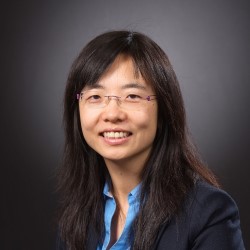 We wrap up Asian and Pacific Islander Heritage Month with an Excellence in STEM interview with Dr. Yuhong Liu, an accomplished Associate Professor in the Department of Computer Science and Engineering at Santa Clara University.
We wrap up Asian and Pacific Islander Heritage Month with an Excellence in STEM interview with Dr. Yuhong Liu, an accomplished Associate Professor in the Department of Computer Science and Engineering at Santa Clara University.
Dr. Liu brings valuable perspectives on fostering an inclusive environment, leveraging diverse voices, and overcoming barriers to inclusion.
Join us as we explore her experiences and recommendations for creating a more inclusive and diverse computing community.
What is your definition and meaning of equity, diversity, and inclusion in the context of computer science and engineering?
To me, equity, diversity, and inclusion mean equal opportunities and resources are provided, and people can be valued and respected for what they are doing, and what they are contributing to regardless of who they are. Especially since innovation is one of the key factors driving the rapid evolution of the computer science and engineering field, an open and inclusive environment where people can freely express their ideas, listen to others, and inspire each other is critical.
What barriers to inclusion have you experienced throughout your career?
Many Asian professionals, especially early career professionals or students, are very polite and believe what you do matters more than what you say. But such a culture plus language barriers may sometimes lead to labels as shy or not engaging.
What are 1-2 ways the computing community can work together to prevent these experiences from occurring to future professionals?
Communication is important and can be facilitated through more social and networking opportunities for participants at conferences and events; creating more work-together opportunities to involve different representatives, such as community or committee works, events organization, workgroups, etc.
A lack of understanding of others’ experiences may sometimes lead to unintended consequences. What recommendations can you make to the community to help them increase their understanding of your culture and/or background that would help individuals feel more welcomed?
Organizing some publicity events, such as seminars, talks, or social events, to promote common knowledge and understanding of different cultures.
The IEEE Computer Society has many local chapters worldwide, but because of various challenges, such as travel difficulties, time zone differences, etc., chapters geographically close to each other tend to have more communications or collaborations. With the convenience provided by online meetings and events, more activities may be organized by involving members from chapters geographically far away.
Can you share an example from your education or career experiences where diverse voices had, or could have had, a significant impact on a project?
For example, one of my research interests is defeating misinformation/disinformation in online social media. Such a grand challenge requires multidisciplinary efforts from not only computer science but also law and regulation, psychology, social science, communication, and more. Conversations with people from different research, fields can help us understand the challenges from different angles, inspire new solutions, and launch coordinated actions to tackle the obstacles, leading to a significant impact on society. In addition, as the younger generation uses online social media almost everywhere in their daily life, their perspective as daily users is very valuable.
Given the importance of computer science and engineering becoming and being a more diverse and inclusive community, we strive to hear the perspectives of persons from equity-seeking populations. What are 1 or 2 ways such diverse perspectives and experiences can be solicited and heard without making the persons who share them feel tokenized or otherwise uncomfortable?
These diverse perspectives and experiences should be heard in a more day-to-day way and embedded in all aspects of our daily work, rather than just for some special events, or in an ad-hoc way. When such a norm is cultivated, people will feel more comfortable to openly share their own perspectives.
More About Dr. Yuhong Liu
Dr. Liu is an Associate Professor in the Department of Computer Science and Engineering, Santa Clara University. She received her B.S. and M.S. degree from Beijing University of Posts and Telecommunications in 2004 and 2007 respectively, and a Ph.D. from the University of Rhode Island in 2012. She is the recipient of the 2019 Researcher of the Year Award at the School of Engineering, Santa Clara University, and the 2013 University of Rhode Island Graduate School Excellence in Doctoral Research Award. Her research interests include trustworthy computing and cyber security of emerging applications, such as online social media, Internet-of-things, and Blockchain. She has published over 70 papers in prestigious journals and peer-reviewed conferences. She has contributed as an organizing committee member and/or a TPC member at more than 30 technical conferences. She actively contributes to professional societies, including IEEE and Asia-Pacific Signal and Information Processing Association (APSIPA). She is currently serving as an IEEE Computer Society Distinguish Visitor (2022-2023), the Chair of IEEE Computer Society Special Technical Communities (STC) Executive Committee Board (2022), and the Chair of the IEEE Computer Society Technical Meeting Request Committee. She is also a member of the Multimedia Security and Forensics (MSF) TC for APSIPA, Associate Editor of APSIPA Transactions on Signal and Information Processing, and an APSIPA Distinguished Lecturer (2021-2022).